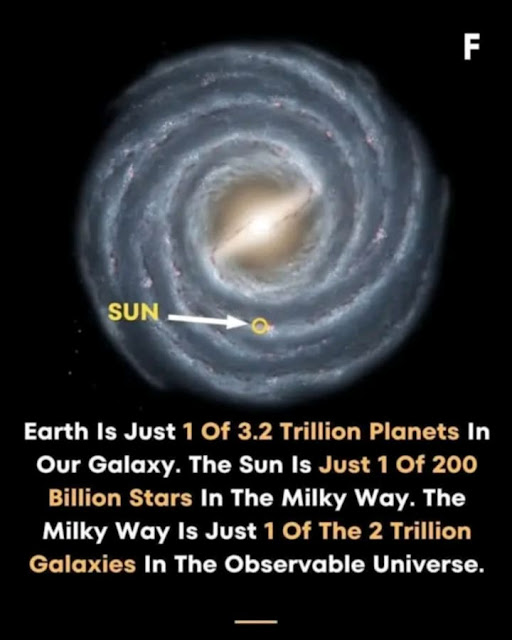From Dust to Infinity: Understanding Earth’s Tiny Place in the Vast Universe
When we gaze at the night sky, it’s easy to feel insignificant — and for good reason. The universe is overwhelmingly vast, and Earth is merely a microscopic speck within it. To grasp the true scale of our cosmic surroundings, let’s break down some astonishing astronomical facts featured in the image above.
🌍 Earth: 1 in 3.2 Trillion
Our planet is one of an estimated 3.2 trillion planets in the Milky Way galaxy alone. That number includes rocky worlds, gas giants, and icy bodies orbiting the galaxy’s hundreds of billions of stars. While only a tiny fraction may host conditions suitable for life, the sheer quantity points to a high likelihood of Earth-like planets existing elsewhere.
☀️ The Sun: 1 in 200 Billion
The Sun, the heart of our solar system, is just one of approximately 200 billion stars in the Milky Way. It's a middle-aged G-type main-sequence star, and there’s nothing particularly unique about it from a galactic perspective. Many stars host planetary systems, and some may resemble our own — or be even more complex.
🌌 The Milky Way: 1 in 2 Trillion Galaxies
And the Milky Way itself? It’s merely one of an estimated 2 trillion galaxies in the observable universe. These galaxies vary in size, shape, and age — ranging from small dwarf galaxies with a few million stars to giant elliptical galaxies containing over a trillion stars.
Each galaxy could potentially host trillions of planets and billions of stars. This places the estimated number of planets in the observable universe into the quintillions — a number so large it's difficult to truly comprehend.
Key Perspective:
| Cosmic Scale | Quantity |
|---|---|
| Planets in Milky Way | ~3.2 Trillion |
| Stars in Milky Way | ~200 Billion |
| Galaxies in Observable Universe | ~2 Trillion |
| Estimated Planets in Observable Universe | Over 10²⁴ (a septillion or more) |
🌠 Why This Matters
Understanding our place in the universe isn’t just humbling — it’s inspiring. These numbers challenge our assumptions about uniqueness, life beyond Earth, and the scale of cosmic time and space. The vastness of the cosmos pushes the boundaries of science, philosophy, and even spirituality.
Astronomy reminds us that while Earth may seem central to our lives, it’s just a small part of a staggeringly immense tapestry — one that we’re only beginning to explore.
🪐WE ARE NOT ALONE
In a universe with trillions of galaxies, stars, and planets, Earth is a cosmic rarity simply because it’s known. But the numbers strongly suggest that we are not alone — we just haven’t looked far enough yet.

